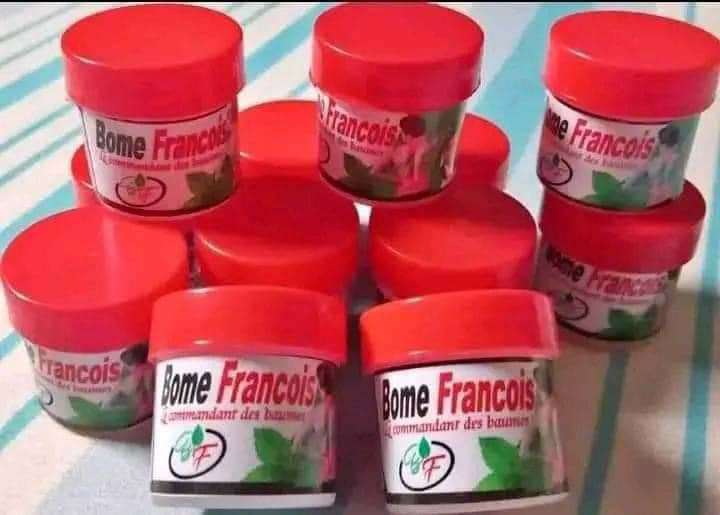Across the streets of Bamenda, like in many towns and cities across Cameroon, young men and women in striking red T-shirts move through the crowd, small public address systems in hand, passionately marketing Bôme François. This locally made health balm has quickly gained a reputation as a natural remedy for various ailments, from nausea, headaches, fever, and a source of employment for many Cameroonian youth. However, despite its growing popularity and health benefits, Bôme François faces regulatory and administrative hurdles that threaten its very existence in the market.
The story of Bôme François is rooted in Cameroon’s response to the COVID-19 pandemic. While much of the world struggled with the virus, African countries, including Cameroon, relied on traditional herbal medicine for prevention and treatment. Inspired by this success, Société François Santé, the company behind the product, embarked on extensive research into the healing properties of plants.
Their efforts led to the development of Bôme François in 2021, followed by two additional products; Jus François and Thé François which have proven effective in addressing a range of health issues, including fatigue, high blood pressure, chlamydia, hepatitis, and even obesity. Within just a few months of its launch in 2023, Bôme François became a household name, providing relief to thousands of consumers while offering economic opportunities to many young people who became brand ambassadors.
Beyond its health benefits, Bôme François has become a lifeline for many unemployed youth in Cameroon. With limited formal job opportunities, the company’s innovative sales model has empowered young men and women to earn a living by marketing and distributing the product. The streets of major towns have become active with Bôme François vendors, each promoting the product through energetic sales pitches amplified by portable speakers.
Moreover, the company’s growth has spurred industrial activity, creating jobs in research, production, and distribution. As a local business, Société François Santé has also contributed to Cameroon’s economy by reducing dependence on imported herbal medicines and dietary supplements from Asia, Europe, and America.
Despite its success, Bôme François has faced major challenges in navigating Cameroon’s regulatory landscape. The company has made numerous attempts to comply with government regulations, submitting applications for official approval and certification through institutions such as the Ministry of Public Health, the National Order of Pharmacists, and the National Laboratory for the Quality Control of Medicines and Expertise.
However, bureaucratic delays and administrative resistance have hindered the standardisation process. The company has accused public health authorities of deliberately slowing down approvals, raising concerns about institutional roadblocks designed to stifle local innovation. In response, Société François Santé drafted a memorandum detailing its struggles, outlining how public administrations are engaging in harassment and bullying rather than supporting local businesses.
In a bid to secure legitimacy, Société François Santé has pursued scientific validation and intellectual property rights. In August 2024, the African Intellectual Property Organisation (OAPI) officially registered the Bôme François trademark, with similar approvals pending for Jus François and Thé François.
Additionally, several scientific analyses conducted by Cameroon’s Ministry of Scientific Research and Innovation have confirmed that the products contain no harmful substances and possess effective medicinal properties. Laboratory tests carried out in Germany further affirmed the product’s compliance with international health standards.
According to the promoters of Bôme François, despite these recognitions, the Ministry of Public Health remains hesitant, raising concerns about an incoherent government stance on promoting local alternatives to foreign pharmaceutical imports.
Public support for Bôme François has been overwhelming. Members of Parliament have acknowledged the product’s contribution to public health, while media platforms have amplified concerns about the government’s resistance to local solutions. Many Cameroonians see the battle over Bôme François as symbolic of a broader struggle between local innovation and institutional barriers that favour foreign pharmaceutical interests.
As the debate intensifies, Société François Santé has appealed to President Paul Biya’s administration to intervene and facilitate the approval process. The company argues that suppressing local innovations contradicts the government’s vision of promoting local enterprise and reducing unemployment.
The risk of social unrest is real, given the thousands of young people whose livelihoods depend on Bôme François sales. A sudden crackdown on the product could lead to economic hardship for many families already struggling in Cameroon’s tough economic climate.
For now, Bôme François remains widely consumed despite the ongoing regulatory battle. The question remains whether the Cameroonian government will embrace and support this local initiative or continue to place obstacles in its path. With mounting public pressure, the authorities must decide whether to prioritise bureaucratic rigidity or harness the potential of a homegrown solution that is already transforming lives.
One thing is certain; Bôme François is more than just a herbal remedy; it is a symbol of economic empowerment, and the fight for local innovation in Cameroon. The battle for its survival could shape the future of homegrown enterprises in the country for years to come.
By Bakah Derick
Email: hilltopvoicesnewspaper@gmail.com
Tel: 6 94 71 85 77
Tags
About Hilltopvoices
Bakah Derick
Business
City News
Community Development
Education
Environment
Health
Home
Inclusive Development
Lifestyle
Local News
News
Opinion
Sports
Youth Day



